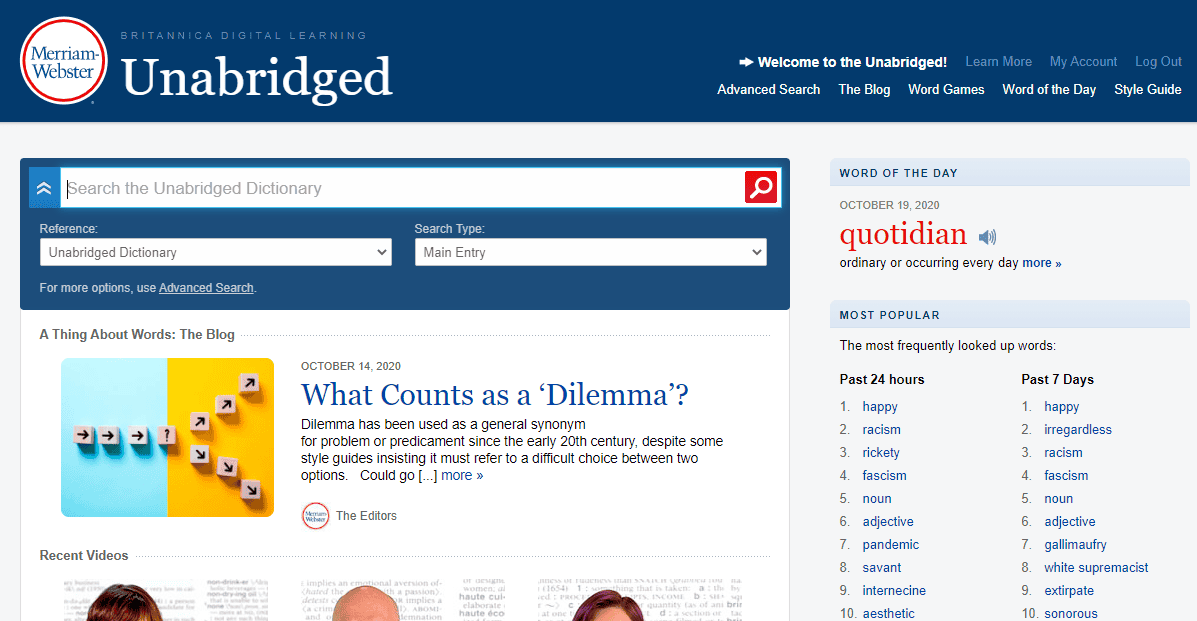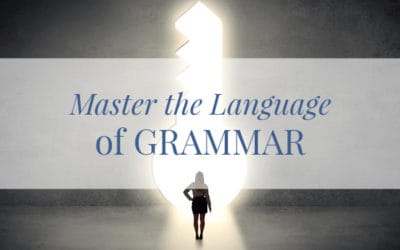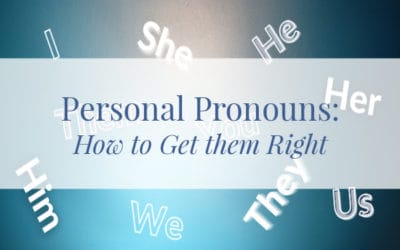What dictionary do you use?
I love using physical reference books. But for the two books I used the most often, The Chicago Manual of Style and Merriam-Webster’s Collegiate Dictionary, I use the online version the most.
Since I spend most of my time editing novels, I have to look up words many times per day.
I even have a macro for it with a keyboard shortcut that pulls up the dictionary entry on Merriam-Webster’s website for any word in seconds. I’m all about making my editing more cost-effective for the authors I work with, so macros are one of my favorite editing tools.
You probably don’t have to look things up quite as often as I do. But when you do, what is the best option?
Merriam-Webster’s Collegiate Dictionary
I consider Merriam-Webster the gold standard in dictionaries because I edit fiction in American English. I do sometimes edit manuscripts in Canadian or British English, for which Canadian or British dictionaries are needed. But most of my work is in American English.
The American Heritage Dictionary is also worth mentioning.
But Merriam-Webster is the most authoritative dictionary of American English. It’s also the dictionary recommended by The Chicago Manual of Style, which is the style manual and primary reference on punctuation and grammar for many types of writing including both fiction and nonfiction books.
Merriam-Webster’s Collegiate Dictionary in print
On my bookshelf I have the eleventh edition of Merriam-Webster’s Collegiate Dictionary.
I have the most recent version with a 2020 copyright and thousands of new words added since the previous printing. But since the eleventh edition was originally published in 2003, this book hasn’t been fully updated in almost two decades.
Merriam-Webster’s online dictionary
At merriam-webster.com you can find the online dictionary counterpart to the Collegiate.
This has similar content to the print version but with extra space to present it in more detail. While physical books have a limited amount of space on each page, a website has room to add more content.
The website was created simply as an online version of Merriam-Webster’s Collegiate Dictionary, Eleventh Edition. Since then it has been continually updated and expanded, and several new features have been added specifically for readers of the online dictionary.
For example, there is a section in each entry with examples of recent use in online news publications, which can help readers see how the word is currently being used in the real world. In the image below, I looked up the word “hypothetical”:
Each entry also has an audio recording for anyone who wants to learn the correct pronunciation without needing to know how to read phonetic symbols.
The online version is more up-to-date
The Merriam-Webster FAQ page states that “In cases where discrepancies occur between the print Collegiate® Dictionary and the Merriam-Webster.com Dictionary, the Merriam-Webster.com Dictionary typically provides the most up-to-date information.”
If you want to look up a word like “bioabsorbable,” you’ll only find it in the online dictionary. It was added by Merriam-Webster in April 2019 along with many others such as “screen time,” “buzzy,” and “gig economy.”
Because of the time it takes for a book to get published, a dictionary can already be considered out-of-date by the time it reaches the shelves. Even if you’re looking for words added several years ago, you’ll need the online dictionary to look up “photobomb,” “conlang,” “Seussian,” or “SCOTUS.”
And new words that have only recently come into our general vocabulary are sometimes the same ones that you don’t know yet and need to look up the definition or spelling for.
Merriam-Webster Unabridged
At unabridged.merriam-webster.com is Merriam-Webster’s online edition of their unabridged dictionary. Unlike the Collegiate online dictionary, the Unabridged is only accessible to those with a subscription, which costs $4.95 per month or $29.95 per year and also includes the ability to search the Collegiate without ads.
The most recent edition of the Unabridged in print is called Webster’s Third New International Dictionary and was published in 1961.
This online edition is the fourth edition, named Merriam-Webster Unabridged, with updates begun in 2011 and, to my knowledge, is still ongoing. Updating an unabridged dictionary that is fifty years out-of-date is understandably a detailed and time-consuming process.
Comparing the Collegiate and the Unabridged
Merriam-Webster’s online Collegiate is more up-to-date than the Unabridged, but the latter is still helpful in several ways. Namely, the unabridged online dictionary provides more definitions and example sentences on many entries and additionally has words that don’t appear in the Collegiate.
Sometimes I like to look up a word in both versions when I want a thorough understanding of the word and its most current definitions.
For example, if you search “they” in the online Collegiate you will see the definition “3. d —used to refer to a single person whose gender identity is nonbinary.” If you then search the unabridged version, you’ll find that this entry hasn’t been updated since Merriam-Webster started recognizing its use as a gender pronoun for nonbinary people (which was in Merriam-Webster’s update of September 2019).
So which dictionary to choose?
If you are looking for a reliable dictionary of American English, whether in a professional capacity or not, I strongly encourage you to use the online Collegiate at merriam-webster.com. It gives authoritative and up-to-date definitions as well as example sentences, etymological information, synonyms, and dates of first known use.
It’s also free, though there will be ads.
If you’re an author writing in American Englihs, using Merriam-Webster as you’re writing will make the editing process go more smoothly since there will be less for your copyeditor to change.
If you enjoy using a paper dictionary, this isn’t necessarily a bad idea. I do have a print copy of Merriam-Webster’s Collegiate Dictionary, but especially for a more casual user, the online dictionary will be more useful.
I recommend staying away from the 1961 unabridged version that is both vastly out of date and extremely large and heavy.
What do these dictionaries cost?
The online dictionary at merriam-webster.com costs absolutely nothing, which is one of the main reasons why I encourage everyone to use it.
It isn’t necessary to spend money in order to get access to Merriam-Webster’s authoritative definitions and other resources. But if you’re curious, purchasing the Collegiate print hardcover is $27.95 from the Merriam-Webster website and will include a year’s subscription to Merriam-Webster Unabridged. Purchasing the print version of the unabridged dictionary is $129.00 and also comes with the online subscription.
Just purchasing the subscription to Merriam-Webster Unabridged would cost you $29.95 per year or $4.95 per month.
Is an unabridged dictionary worth it?
If you are a writer or an editor and use a dictionary in your professional life, it could be worth it to get a subscription to Merriam-Webster Unabridged. It may depend on how often you find the Collegiate unsatisfactory when you’re looking up words. For words that aren’t particularly new, the unabridged dictionary will give you more information.
I have found it helpful in the past, particularly the additional example sentences that can help confirm a word’s usage in specific situations.
But you may find everything you need from the merriam-webster.com online dictionary.








